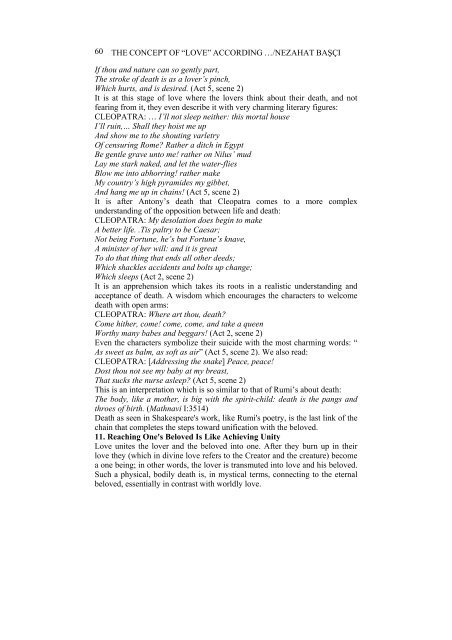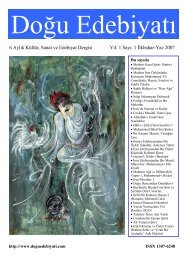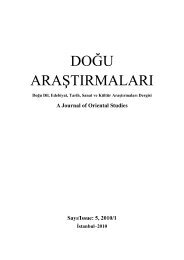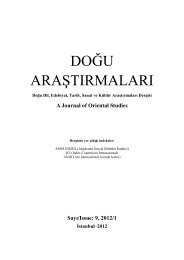A Journal of Oriental Studies Sayı/Issue - Doğu Edebiyatı
A Journal of Oriental Studies Sayı/Issue - Doğu Edebiyatı
A Journal of Oriental Studies Sayı/Issue - Doğu Edebiyatı
Create successful ePaper yourself
Turn your PDF publications into a flip-book with our unique Google optimized e-Paper software.
60<br />
THE CONCEPT OF “LOVE” ACCORDING …/NEZAHAT BAŞÇI<br />
If thou and nature can so gently part,<br />
The stroke <strong>of</strong> death is as a lover’s pinch,<br />
Which hurts, and is desired. (Act 5, scene 2)<br />
It is at this stage <strong>of</strong> love where the lovers think about their death, and not<br />
fearing from it, they even describe it with very charming literary figures:<br />
CLEOPATRA: … I’ll not sleep neither: this mortal house<br />
I’ll ruin,… Shall they hoist me up<br />
And show me to the shouting varletry<br />
Of censuring Rome? Rather a ditch in Egypt<br />
Be gentle grave unto me! rather on Nilus’ mud<br />
Lay me stark naked, and let the water-flies<br />
Blow me into abhorring! rather make<br />
My country’s high pyramides my gibbet,<br />
And hang me up in chains! (Act 5, scene 2)<br />
It is after Antony’s death that Cleopatra comes to a more complex<br />
understanding <strong>of</strong> the opposition between life and death:<br />
CLEOPATRA: My desolation does begin to make<br />
A better life. .Tis paltry to be Caesar;<br />
Not being Fortune, he’s but Fortune’s knave,<br />
A minister <strong>of</strong> her will: and it is great<br />
To do that thing that ends all other deeds;<br />
Which shackles accidents and bolts up change;<br />
Which sleeps (Act 2, scene 2)<br />
It is an apprehension which takes its roots in a realistic understanding and<br />
acceptance <strong>of</strong> death. A wisdom which encourages the characters to welcome<br />
death with open arms:<br />
CLEOPATRA: Where art thou, death?<br />
Come hither, come! come, come, and take a queen<br />
Worthy many babes and beggars! (Act 2, scene 2)<br />
Even the characters symbolize their suicide with the most charming words: “<br />
As sweet as balm, as s<strong>of</strong>t as air” (Act 5, scene 2). We also read:<br />
CLEOPATRA: [Addressing the snake] Peace, peace!<br />
Dost thou not see my baby at my breast,<br />
That sucks the nurse asleep? (Act 5, scene 2)<br />
This is an interpretation which is so similar to that <strong>of</strong> Rumi’s about death:<br />
The body, like a mother, is big with the spirit-child: death is the pangs and<br />
throes <strong>of</strong> birth. (Mathnavi I:3514)<br />
Death as seen in Shakespeare's work, like Rumi's poetry, is the last link <strong>of</strong> the<br />
chain that completes the steps toward unification with the beloved.<br />
11. Reaching One's Beloved Is Like Achieving Unity<br />
Love unites the lover and the beloved into one. After they burn up in their<br />
love they (which in divine love refers to the Creator and the creature) become<br />
a one being; in other words, the lover is transmuted into love and his beloved.<br />
Such a physical, bodily death is, in mystical terms, connecting to the eternal<br />
beloved, essentially in contrast with worldly love.





